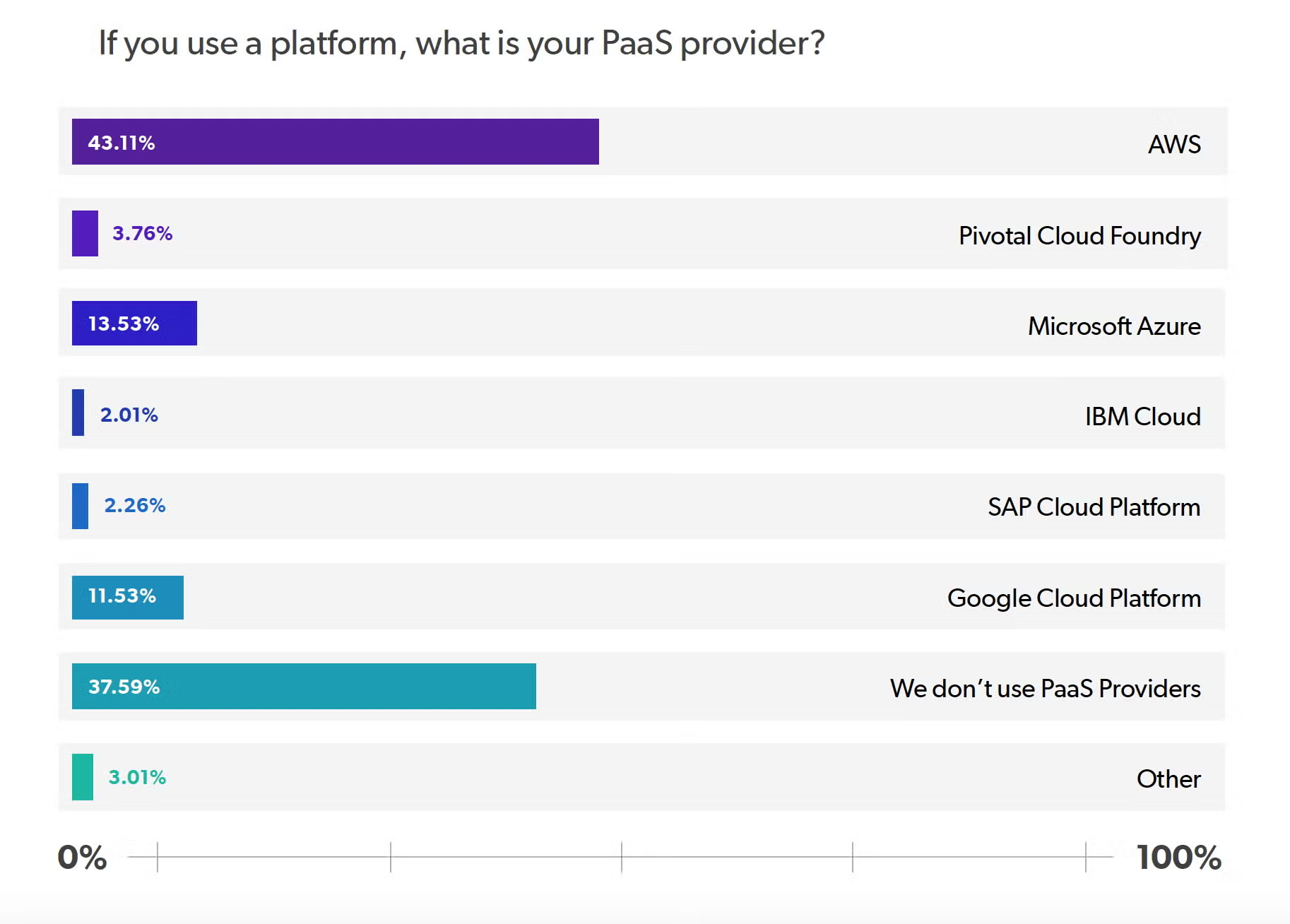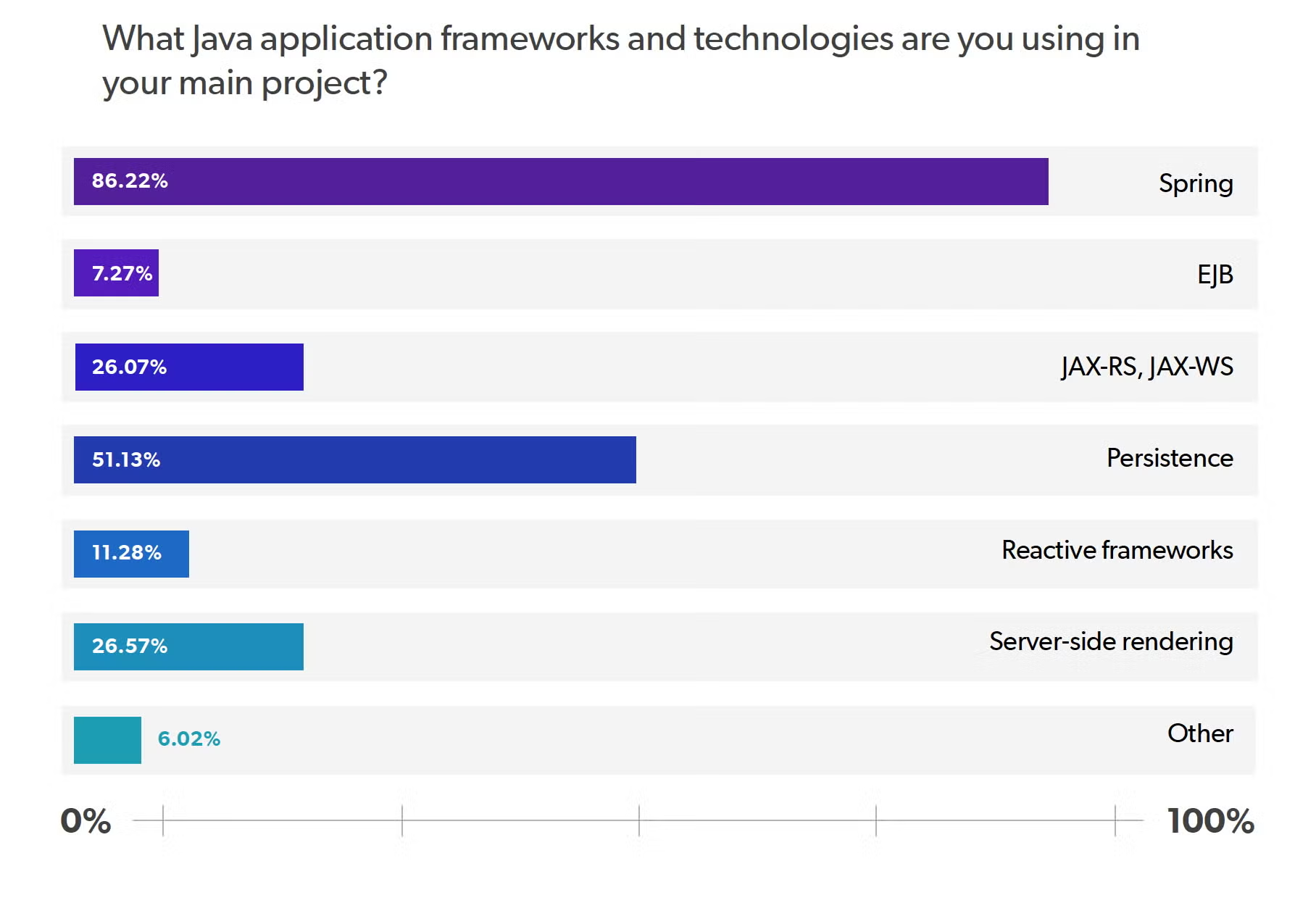Picking the right Java framework is critical to long term success for a Java application. But finding one that both suits the application, and is extensible for future needs can be a challenge.
In this article, we’ll give an overview of the most popular Java frameworks today, including the best Java web frameworks, MVC frameworks, and cloud frameworks/platforms.
What Are Java Frameworks?
A Java framework is software that provides an extensible and standardized way to build and deploy applications. Depending on the framework, they may include tools, compilers, libraries, and APIs.
For the purposes of this article, we'll be breaking down Java frameworks into a few common use categories for application development:
- Java Web Frameworks - Frameworks used in creating web-based Java applications.
- Java MVC Frameworks - Frameworks used in developing user interfaces.
- Java Cloud Frameworks - Frameworks/platforms for cloud-based Java applications.
- Java ORM Frameworks - Frameworks used for object-relational mapping.
It's important to note that each framework has strengths and weaknesses, and the frameworks we cover here today aren't necessarily the best fit for every project.
Back to topWant to see how much time JRebel can save you based on the framework you use? Try our new JRebel ROI calculator! It lets you calculate potential time savings for you and your team in a few seconds.
Best Java Web Frameworks
For Java web development, developers use a variety of different frameworks to suit the needs of their application. There are numerous Spring frameworks focused on creation of web applications, some of which we'll discuss in different sections in this article.
In this section, we'll look at the best Java web frameworks out there, Spring, GWT and JSF.
1. Spring
Spring offers a lightweight solution for developers who want to create web applications. With modules like Spring Security focused on authentication and authorization in Java applications, and Spring Session, focused on managing session information, the Spring framework is extensible and suitable for applications at enterprise scale.
Additional framework specifications, like Spring Web Flow, accommodate stateful web applications, while other specifications like Spring Web Services facilitate contract-first SOAP service development.
Perforce OpenLogic offers 24/7 technical support for the Spring Framework >>
2. GWT
The Google Web Toolkit, or GWT, helps developers to create Java applications with Javascript front-ends. It's open source, free, and includes Java API libraries, widgets, a compiler, and development server. GWT allows the underlying application to be object-oriented (since it's in Java), even if it's later compiled into Javascript. GWT has a steep learning curve, and because of that, and other options, isn't as well adopted as Spring.
3. JSF
JavaServer Faces are used to simplify the creation of web-based user interfaces. Used with Java EE and on enterprise scale web applications, JSF specifications use XML files to process events and create responses. For those on the cutting edge of open source, JakartaServer Faces provide the same benefits with Jakarta EE.
Back to topBest Java MVC Frameworks
This may be a strange distinction to make, as many popular Java web frameworks already use the model-view-controller (MVC) pattern. But for this article, we wanted to look at the best Java MVC frameworks as a subset. So which Java frameworks are best for MVC-based applications?
1. Spring MVC
Spring Web MVC is the original MVC implementation of the Spring framework. Because it's interface-based, it's highly customizable and because it avoids concrete inheritance and explicit dependencies, it's less-coupled, and easier to test.
2. Struts
Apache Struts is an open-source alternative to Spring MVC. But, unlike Spring MVC, Struts creates a more coupled MVC structure due to dependencies. Struts 2 introduced the interceptor API, making those dependencies less of a concern. Struts also has a history of security issues, so be sure to pay attention for updates if you use it.
Back to topBest Java Cloud Frameworks
For developers who want to build cloud-native Java applications, it can be hard to choose between a cloud-native framework, or a more integrated solution like a PaaS or IaaS. In our recent Java developer survey, we found that for Java developers using PaaS services, most are using AWS or Azure. But we would also venture a guess that most of those developers are using Spring Cloud for AWS or Spring Cloud Azure.

Although Spring Cloud, in its various versions, is arguably the most popular Java cloud framework, there are a few other cloud-native frameworks worth mentioning, including the relative newcomers in Micronaut and Quarkus.
1. Spring Cloud
Spring Cloud serves as the most mature and well-adopted cloud frameworks for Java. Suitable for many different distributed application patterns, it provides a quick and reliable way to build services and applications. Perhaps more importantly, Spring Cloud integrates well with popular PaaS providers like Cloud Foundry, AWS (using Spring Cloud for AWS), and Azure (using Spring Cloud Azure).
2. Micronaut
While less known and used than Spring Cloud, Micronaut is quickly making a name for itself as a polyglot, full-stack framework that lends itself well to microservice and serverless applications. The primary benefit, when compared to Spring, is that it starts up fast, and doesn't consume as much memory for large codebases.
3. Quarkus
Quarkus was recently awared the 2020 Devies award for the best innovation in code frameworks and libraries -- which must mean they're doing something right. Like Micronaut, their application is tailored to GraalVM, and boasts low RSS memory -- making it perform much better than the typical cloud-native stack.
Back to topBest Java ORM Frameworks
Java applications often need to communicate between relational databases and object-oriented databases utilized in MVC applications. And, as you can see by the results below, more than half of the Java developers we surveyed are working with persistence technologies like Hibernate or EclipseLink.

But what makes an ORM framework stand out? Let's take a closer look at a few of the best Java ORM Frameworks.
1. Hibernate
Hibernate is probably the most popular ORM framework on our list. As we've talked about in previous blogs, Hibernate has issues, but does a good job of interfacing incompatible databases and does it without making developers dabble too deeply in SQL. Though open-source, Hibernate is considered scalable -- making it a popular choice for enterprise scale applications.
2. EclipseLink
EclipseLink is the open source JPA implementation from the Eclipse foundation. It allows developers to bind Java classes to XML or JSON, and implement JAXB and SDO standards. While not as mature as Hibernate, EclipseLink is still a popular JPA implementation.
Back to topFinal Thoughts
When it comes to frameworks, Java developers have a wide selection of purpose-built frameworks to suit their needs. In this blog, we looked at the best Java frameworks for ORM, MVC, Cloud, and web-facing applications. Looking to further optimize your Java tech stack? Consider eliminating redeploys with JRebel.
Additional Resources
Want to learn more about Java frameworks? The articles below may help: